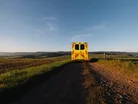Rural Healthcare Innovations from CVS Health & Zipline

Approximately 42.66% of the world's population live in rural areas, close to 3.4bn people. As many of these people work in the agriculture sector, their education and healthcare is of extreme importance.
Healthcare leaders are working hard to ensure that remote communities have access to the medicine and technology that they need to treat patients in emergencies, as well as safeguarding their long-term wellbeing.
CVS Health makes healthcare accessible for all communities
CVS Health created the Community Equity Alliance, which addresses the barriers to healthcare in certain communities. The goal is to help to make healthcare more accessible and to remove health disparities.
Meharry Medical College, Sinai Chicago and Wayne State University have joined the initiative. They will share data with CVS Health on local community needs.
“This is about elevating the lived experiences in communities and about elevating the community health worker workforce,” shared Joneigh Khaldun, M.D., Vice President and Chief Health Equity Officer of CVS Health.
Healthcare Digital spoke with Mario Rivera, SVP and Chief Supply Chain and Logistics Officer to discuss the development and execution of CVS Health’s supply chain network transformation strategy.
“Consumers are asking for multiple options on how to get their products delivered, so we are in a very omnichannel world,” he told us. “The pandemic accelerated e-commerce and direct-to-consumer delivery but soon after we came out of that it became evident consumers wanted more. They wanted omnichannel convenience.”
Read the full interview here.
Supporting remote communities with drones
Some healthcare innovators are taking to the skies to deliver aid to remote communities. Zipline, based in San Francisco, is on a mission to create a logistics system to ‘serve all humans equally’, with airborne transport. Zipline designs, manufactures and operates what it calls ‘the world’s largest automated delivery system’.
In Ghana, Zipline drones have been delivering life-saving vaccines across rough roads, where long journeys no longer delay immunisations reaching patients. This initiative has increased immunisation rates by 50%.
“To keep these innovations going, we’re calling on world governments to support Gavi’s US$9bn replenishment to protect 500m children between 2026 - 2030, preventing more than 8m deaths and building global health security for the future,” said Keller Rinaudo, Zipline’s Chief Executive.
Zipline previously partnered with Toyota Tsusho, a group company Toyota Motor Corp, to lead a drone delivery service for Japan’s remote Goto Islands.
Teleradiology is revolutionising healthcare in rural Australia
The issue of supporting those in rural areas is not just a challenge in Developing Countries. Millions of Australians call rural communities their home, but many healthcare facilities in rural areas are under-staffed and under-resourced, with limited access during and outside of regular business hours.
Radiology is a critical branch of medicine, one that is needed across almost 80% of all patient pathways. Yet a shortage of radiologists persists across Australia, with ‘a disproportionately high number of clinical radiologists in the major cities’, making radiologists in rural Australia particularly scarce. According to the Royal Australian and New Zealand College of Radiologists (RANZCR), only 12% of clinical radiologists are located in regional and rural areas.
“This disparity meant that patients from rural communities face significant delays in diagnosis and treatment due to the shortage of radiologists,” says Wayne Hartmann, ANZ CEO, Everlight Radiology. “Teleradiology, the practice of transmitting radiological images and reports over long distances, has emerged as a powerful tool to address this challenge.”
Everlight Radiology is a leading provider of teleradiology services in Australia. Whether a customer is a large hospital in a metropolitan area, a district hospital or multipurpose health service (MPHS) in a rural setting, it provides access to more than 250 RANZCR trained radiologists.
“Our network of Consultant Radiologists has specialists across all areas, including Emergency, MSK, Neurology, Gynaecology, Oncology, GIGU, Vascular, Paediatric, Urology, Head and Neck, PET CT, Nuclear Medicine and Cardiac CT,” he continues. “Our teleradiology model enables any hospital – large or small, whether they have an in-house radiology team or not – to quickly access a huge bank of experienced radiologists, including ‘sub speciality’. Our Consultant Radiologists either work from one of our hubs based in major cities (Sydney, Melbourne, Brisbane and Perth) or, increasingly, they work from their own home.”
The adoption of teleradiology benefits rural communities chiefly by unlocking access to faster diagnosis and treatment. By reducing turnaround times for radiology reports, teleradiology can expedite the diagnostic process and lead to more efficient treatment plans. Even small rural facilities can access a wide network of radiologists at any time of the day and night. The speed of responding to diagnostic imaging is critical and can be life-saving; for example, for a stroke patient every second counts.
“Unfortunately, there are still significant issues in the provision of diagnostic services in rural Australia, with a lack of MRI and CT scanners in more remote areas,” adds Wayne. “This is partly due to high costs and logistical challenges for installing and maintaining equipment, as well as recruiting the healthcare professionals to operate the machines. The Australian government has been working to address the disparity. For example, the Stronger Rural Health Strategy hopes to improve access to MRI services in rural areas by deregulating MRI Medicare equipment eligibility requirements.”
Teleradiology can help bridge the gap in access to high quality healthcare by ensuring that patients in remote communities have access to the same quality of radiology care as their city-dwelling counterparts.
******
Make sure you check out the latest industry news and insights at Healthcare Digital and also sign up to our global conference series - Tech & AI LIVE 2024
******
Healthcare Digital is a BizClik brand

